上学期Unit7livingwithdisease人教版(精)
- 格式:ppt
- 大小:630.50 KB
- 文档页数:14
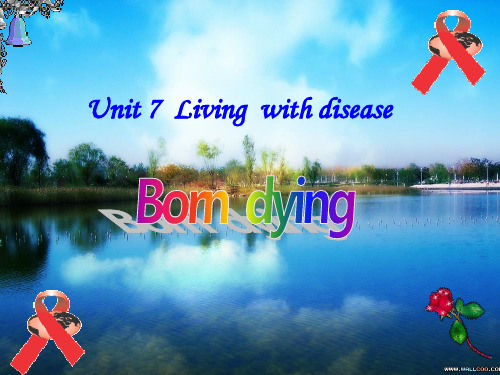
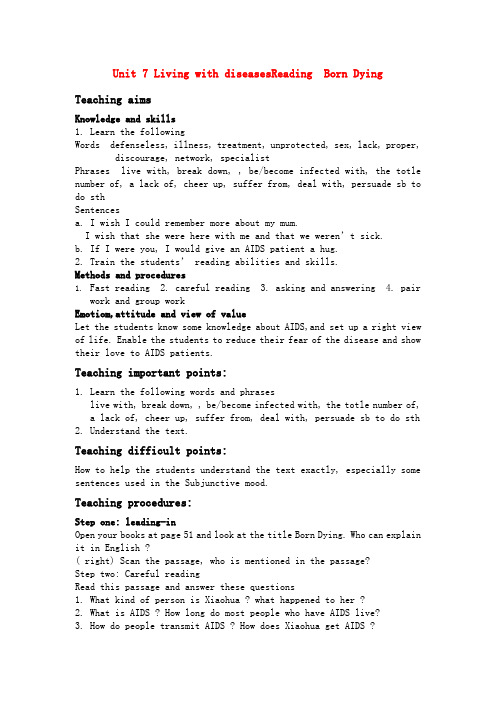
Unit 7 Living with diseasesReading Born Dying Teaching aimsKnowledge and skills1.Learn the followingWords defenseless, illness, treatment, unprotected, sex, lack, proper, discourage, network, specialistPhrases live with, break down, , be/become infected with, the totle number of, a lack of, cheer up, suffer from, deal with, persuade sb to do sthSentencesa. I wish I could remember more about my mum.I wish that she were here with me and that we weren’t sick.b. If I were you, I would give an AIDS patient a hug.2. Train the students’ reading abilities and skills.Methods and procedures1.Fast reading2. careful reading3. asking and answering4. pairwork and group workEmotiom,attitude and view of valueLet the students know some knowledge about AIDS,and set up a right view of life. Enable the students to reduce their fear of the disease and show their love to AIDS patients.Teaching important points:1.Learn the following words and phraseslive with, break down, , be/become infected with, the totle number of,a lack of, cheer up, suffer from, deal with, persuade sb to do sth2.Understand the text.Teaching difficult points:How to help the students understand the text exactly, especially some sentences used in the Subjunctive mood.Teaching procedures:Step one: leading-inOpen your books at page 51 and look at the title Born Dying. Who can explain it in English ?( right) Scan the passage, who is mentioned in the passage?Step two: Careful readingRead this passage and answer these questions1.What kind of person is Xiaohua ? what happened to her ?2.What is AIDS ? How long do most people who have AIDS live?3.How do people transmit AIDS ? How does Xiaohua get AIDS ?4.What situation is AIDS spreading ?5.W hat has Xiaohua done after she knew her disease ?6.Is the disease the only thing that AIDS patients suffer from ? Whatelse ?7.How is Xiaohua trying to change this ?8.What is Xiaohua’s attitude to her life ?Now read the passage again and tell me the main idea of each paragraph Para1 Introduce XiaohuaPara2 About AIDSPara3 The ways of transmitting AIDSPara4 The situation of children and AIDSPara5/6 Xiaohua’s actionPara7 Xiaohua’s attitudeStep three: Language pointsNow find out the following phrases1.live with Tom lives with his grandparents.2.break down This disease break down his health/body.3.be/become infected with Xiaohua is infected with AIDS since shewas 3 years old.4.the totle number of The totle number of these books in the libraryis as many as one hundred thousand.5.a lack of She cann’t buy the bike because of a lack of money.6.cheer up I encourged mary and cheeres her up.7.suffer from She is suffering from a bad cold.8.deal with AIDS patients must deal with people’s fear of the disease.9.persuade sb to do sth My mother persuaded me to work hard.Now please look at the two sentences1. I wish I could remember more about my mum.I wish that she were here with me and that we weren’t sick.2. If I were you, I would give an AIDS patient a hug.These are Subjunctive Mood which express an untrue situation. Please find their characteristics. (let the students say out)Step four: DiscussionWhat should we do for AIDS patients like Xiaohua ?Step five: PracticeDo exercises 1 and 2 in the workbookStep six: Summary and homeworkIn this class we’ve not only learnt more about AIDS but also learnt how to act towards people who have AIDS. We should call on all the people to fight against AIDS. After class please read the passage more times in order to understand it better.Step seven: The design of the writing on the blackboardStep eight: Record after teaching。
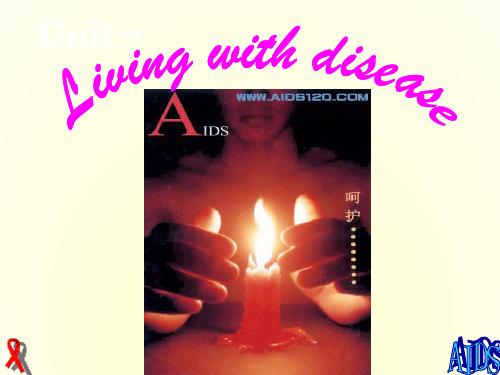

Unit 7 Living with diseasesReading Born DyingTeaching aimsKnowledge and skills1.Learn the followingWords defenseless, illness, treatment, unprotected, sex, lack, proper, discourage, network, specialistPhrases live with, break down, , be/become infected with, the totle number of, a lack of, cheer up, suffer from, deal with, persuade sb to do sthSentencesa. I wish I could remember more about my mum.I wish that she were here with me and that we weren’t sick.b. If I were you, I would give an AIDS patient a hug.2. Train the students’ reading abilities and skills.Methods and procedures1.Fast reading2. careful reading3. asking and answering4. pair work and groupworkEmotiom,attitude and view of valueLet the students know some knowledge about AIDS,and set up a right view of life. Enable the students to reduce their fear of the disease and show their love to AIDS patients.Teaching important points:1.Learn the following words and phraseslive with, break down, , be/become infected with, the totle number of, a lack of, cheer up, suffer from, deal with, persuade sb to do sth2.Understand the text.Teaching difficult points:How to help the students understand the text exactly, especially some sentences used in the Subjunctive mood.Teaching procedures:Step one: leading-inOpen your books at page 51 and look at the title Born Dying. Who can explain it in English ?( right) Scan the passage, who is mentioned in the passage?Step two: Careful readingRead this passage and answer these questions1.What kind of person is Xiaohua ? what happened to her ?2.What is AIDS ? How long do most people who have AIDS live?3.How do people transmit AIDS ? How does Xiaohua get AIDS ?4.What situation is AIDS spreading ?5.W hat has Xiaohua done after she knew her disease ?6.Is the disease the only thing that AIDS patients suffer from ? What else ?7.How is Xiaohua trying to change this ?8.What is Xiaohua’s attitude to her life ?Now read the passage again and tell me the main idea of each paragraphPara1 Introduce XiaohuaPara2 About AIDSPara3 The ways of transmitting AIDSPara4 The situation of children and AIDSPara5/6 Xiaohua’s actionPara7 Xiaohua’s attitudeStep three: Language pointsNow find out the following phrases1.live with Tom lives with his grandparents.2.break down This disease break down his health/body.3.be/become infected with Xiaohua is infected with AIDS since she was 3 years old.4.the totle number of The totle number of these books in the library is as manyas one hundred thousand.5. a lack of She cann’t buy the bike because of a lack of money.6.cheer up I encourged mary and cheeres her up.7.suffer from She is suffering from a bad cold.8.deal with AIDS patients must deal with people’s fear of the disease.9.persuade sb to do sth My mother persuaded me to work hard.Now please look at the two sentences1. I wish I could remember more about my mum.I wish that she were here with me and that we weren’t sick.2. If I were you, I would give an AIDS patient a hug.These are Subjunctive Mood which express an untrue situation. Please find their characteristics. (let the students say out)Step four: DiscussionWhat should we do for AIDS patients like Xiaohua ?Step five: PracticeDo exercises 1 and 2 in the workbookStep six: Summary and homeworkIn this class we’ve not only learnt more about AIDS but also learnt how to act towards people who have AIDS. We should call on all the people to fight against AIDS. After class please read the passage more times in order to understand it better.Step seven: The design of the writing on the blackboardUnit 7 Reading Born DyingThe main idea of each paragraphPara1 Introduce XiaohuaPara2 About AIDSPara3 The ways of transmitting AIDSPara4 The situation of children and AIDSPara5/6 Xiaohua’s actionsPara7 Xiaohua’s attitudePhraseslive with,break down, , be/become infected with, the totle number of, a lack of, cheer up, suffer from, deal with, persuade sb to do sthsentences1.I wish that … were/ could/ would ….2.If I were…., …. would/ could ….Step eight: Record after teaching。
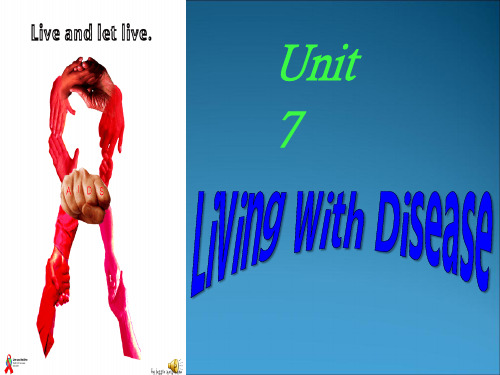
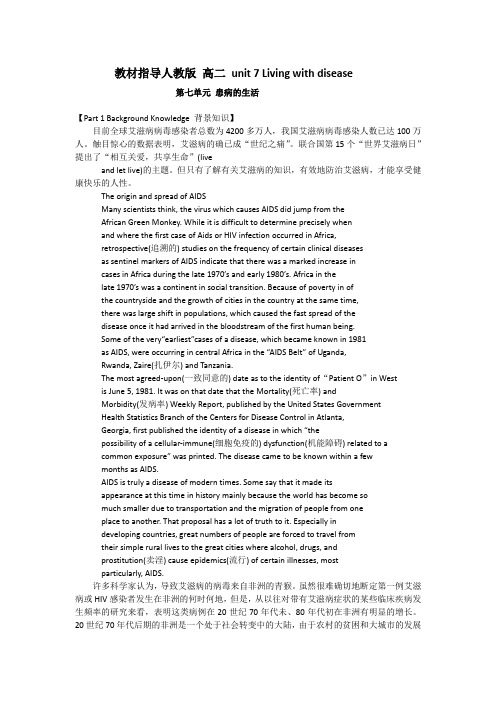
教材指导人教版高二unit 7 Living with disease第七单元患病的生活【Part 1 Background Knowledge 背景知识】目前全球艾滋病病毒感染者总数为4200多万人,我国艾滋病病毒感染人数已达100万人。
触目惊心的数据表明,艾滋病的确已成“世纪之痛”。
联合国第15个“世界艾滋病日”提出了“相互关爱,共享生命”(liveand let live)的主题。
但只有了解有关艾滋病的知识,有效地防治艾滋病,才能享受健康快乐的人性。
The origin and spread of AIDSMany scientists think, the virus which causes AIDS did jump from theAfrican Green Monkey. While it is difficult to determine precisely whenand where the first case of Aids or HIV infection occurred in Africa,retrospective(追溯的) studies on the frequency of certain clinical diseasesas sentinel markers of AIDS indicate that there was a marked increase incases in Africa during the late 1970’s and early 1980’s. Africa in thelate 1970’s was a continent in social transition. Because of poverty in ofthe countryside and the growth of cities in the country at the same time,there was large shift in populations, which caused the fast spread of thedisease once it had arrived in the bloodstream of the first human being.Some of the very“earliest”cases of a disease, which became known in 1981as AIDS, were occurring in central Africa in the “AIDS Belt” of Uganda,Rwanda, Zaire(扎伊尔) and Tanzania.The most agreed-upon(一致同意的) date as to the identity of“Patient O”in Westis June 5, 1981. It was on that date that the Mortality(死亡率) andMorbidity(发病率) Weekly Report, published by the United States GovernmentHealth Statistics Branch of the Centers for Disease Control in Atlanta,Georgia, first published the identity of a disease in which “thepossibility of a cellular-immune(细胞免疫的) dysfunction(机能障碍) related to acomm on exposure” was printed. The disease came to be known within a fewmonths as AIDS.AIDS is truly a disease of modern times. Some say that it made itsappearance at this time in history mainly because the world has become somuch smaller due to transportation and the migration of people from oneplace to another. That proposal has a lot of truth to it. Especially indeveloping countries, great numbers of people are forced to travel fromtheir simple rural lives to the great cities where alcohol, drugs, andprostitution(卖淫) cause epidemics(流行) of certain illnesses, mostparticularly, AIDS.许多科学家认为,导致艾滋病的病毒来自非洲的青猴。
Unit 7 Living with diseases Step V. Language points.1. deadly adj 致命的,致死的/ 不共戴天的,充满仇恨的adv (口)极其,非常a. Guns are deadly weapons .b. The disease is deadly.c. AIDS is a kind of deadly disease .d. He is my deadly enemy .e. His face is deadly pale. / I’m deadly tired .2. In 2002, there were 42 million people living with AIDS in the world.a. Yesterday the biggest store in town caught fire. And there were a great Many people watching the fire in the street.b. There is a train leaving at nine p.mLive with 与。
生活在一起;忍受,忍耐c. He doesn’t live with his parents.d. You have to learn to live with stress.3. inject +sb / sth with …be injected with …infect sb with a theory = influence sb with a theorya. The patient infected the nurse with a bad coldb. The laboratory animals had been infected with the bacteria.c. When he was in prison, he was infected with all sorts of antisocial ideas .4. via 经过;经由/ 凭借;通过a. We went to London via Paris.b. He sent me a love letter via one of my friends.c. The program was telecast live via satellite.5. take notes (of ) You should form the habit of taking notes in class.Please take notes of what the headmaster said.take note of Take note of what I say and please don’t forget it .make a note/ notes of Make notes of how much you spent on the tripcompare notes His wife and my mother often compare notes aboutcookingspeak from notes / without notes She speaks for two hours without a note.6. transmit 传送;传染;传播/传导/ 播送;播放a. This infection is transmitted by mosquitoes .b. If you transmit this kind of bad habits to your friends, you’ll be regretful some day.c. Water can transmit light and sound .d. We can transmit the TV news by TV .7.Persuade sb (not )to do …persuade sb into sth / doing sthpersuade sb out of sth / doing sthpersuade sb of sth / that ….使某人相信/信服。
The Third PeriodTeaching Aims :1.Learn and review some useful words.2.Learn to use the Subjunctive Mood:If l were you.…1 wish I cou ld…Teaching Important Points:1.Master some opposites.2.Learn to guess the missing words and use them correctly according to the given sentences.3.Grammar:The Subjunctive MoodTeaching Difficult Points:Use the right verb—form in the Subjunctive Mood.Teaching Methods:1.Practising to master each language point.2.Individual,pair or group work to make every student work in class.Teaching Aids:1.a projector2.the blackboardTeaching Procedures:Step I GreetingsGreet the whole class as usual.Step ⅡRevision and Lead—inT:Yesterday,we read a passage about an AIDS patient named Xiao Hua.Can you tell the story about her?S s:Yes.T:Any volunteer?S:I wi11 try.Xiao Hua is fifteen and lives in a province in Southern China.Her mother contracted the HIV virus when she was twenty—eight,and she died of AIDS only three years after Xiao Hua was born.Unluckily,Xiao Hua was born dying with AIDS.Although she has her father,who is also infected with AIDS, to take care ofher, they cannot afford the drugs to treat her illness.Xiao Hua knows that she will die before she has a chance to grow o1d, but she does not let that knowledge discourage her. Instead,she decided to use the limited time she has left to do something to help others.She not only help people learn more about how to protect themselves, but also persuade people to show care and love to AIDS patients.She makes her life happy and beautiful.T:Thank you.Sit down,please.Besides, we’ve learnt some useful words and sentence structures in it.Today we’11practise using them.Now,let’s learn the new words in this period.Look at the screen.(Teacher shows the screen and deals with the words briefly.)△vis ible/′vIz∂bl/adj.△defens ive/dI′fens Iv/adj.identify/al′dentIfaI/vt.stranger/′streIndз∂(r)/n.meaningful/′mi:nIηfl/adj.boyfriend/′boIfre nd/n.bi11ionaire/bIlj∂′ne∂(r)/n.Step Ⅲ Word StudyT:Well,now please open your books at Page 52, Look at the first part--Word study.Choose the right word in each sentence.Turn to next page and let’s study the example.“visibl e”and “in visi ble”,which are opposite in meaning,are givenin the bracket.The prefix “in一”gives a negat ive meaning.According to the meaningof the given sentence.“inv isib le”is chosen. Have you understood the example?(Bb:visible—invisible)S s:Yes.T:In the following sentences,some other pairs of opposites are given in the brackets.Now please work in pairs to choose the proper word for each sentence.Aftera while, I will check your answers.Suggested answers:1.infected with 2.incurable3.imaginary 4.defenseless(Teacher writes each pair of opposite on the blackboard.)T:Well done.Now it’s your turn to make sentences.Look at the next part.Four pairs or opposites are listed.You are asked to use one of each pair of the wordsto make your own sentences. T hen show them to your partner and correct each other’s errors.Are you clear?S s:Yes.Suggested sentences:1.1n winter, plants should be protected from the cold.The so1diers were unprotected against the enemy’s surprise attacks.2.He said something proper for the occasion. Laughing and joking are considered improper behaviour at a funeral.3.She was suffering from a headache.She enjoys listening to music.4.Our teacher encouraged us to speak English in class.Don't discourage her;she’s doi ng her best.(Bb:protected/unprotected;proper/improper;suffer/enjoy;encourage/discourage)T:Next,1ook at the third part.Read the following sentences and try to finda word from the text to complete each sentence.Study the example first, Then finish your work individually.At the end,check your answers with your partner and correct mistakes.Suggested answers:1.persuaded 2.patients3.drugs 4.infected5.suffering 6.cure7.contracted 8.virusStep IV GrammarT:Well,so much for Word study.1n the text about Xiao Hua, we’ve also learnt some sentences in the Subjunctive Mood.Now please look at the sentences on the screen.l.I wish I could remember more about my mum.2.I wish she were here with me and that we weren’t sick.3.I wish people would find out the facts and not act as if I were a bad or dangerous person.4.If I were you,I would give an AIDS patient a hug.5.If I had HIV,I would know because I would feel sick.Pay attention to the underlined parts.We can see the Subjunctive Mood in each sentence is expressed with a special verb—form.For example,after “wish”and “as if”, a past tense is used to express a present meaning,“would +aninfinitive ”to express a future mean ing.Is that so?S s:Yes.T:Then what about the verb form after “if”?S s:The past tense is used in the if—clause and “would+an infinitive ”is usedin the main clause to express a present or future meaning.T:Quite right.And we should remember the Subjunctive form “were” is often used instead of “was”;“was”is possible more common in conversational English.Are you clear?S s:Yes.(Bb:I wish…;…as if…;lf I were…,…)T:A11 right.Now please write sentences to explain the sentences on the screen. For example, the first sentence “I wish I cou ld…”means“It is a great pity t hat I don’t remember much about my mum.”Can you understand?S s:Yes.T:OK.Now please prepare for a while. T hen I’ll c heck your work.Suggested answers:2.It is a great pity that she is not here with me but died of AIDS and that I’m sick,too.3.I want people to find out the facts and not consider me as a bad or dangerous person.4.I suggest that you give an AIDS patient a hug.5.Imagine that I have HIV.I will know because I wi11 feel sick.T:Well done! Now,please 1ook at the pictures in our books and make wishes using the Subjunctive Mood.Suggested answers:① I wish I would become an engineer.② I wish I were one of the stars in the sky.③ I wish I could get a big house.(Then teacher asks the students to finish the rest of the parts in Grammar, First individually.Then check in pairs.At the end,teacher asks some students to read their answers and check with the whole class.)Suggested answers:Part 3:1.I wish I could solve my problems.2.I wish I had not been working so hard.3.I wish I could forget the terrible scene.4.I wish we had enough money.5.I wish the performance would go well.6.I wish I had many friends.Part 4:1.If I had enough money,I would want to buy these books.2.If it were not co1d and wet outside,we would let the children playin the garden.3.If you were not wasting so much time to play computer games,I wouldbe like you.4.1f he had not to work hard all day 1ong, he would have time to do the shopping.Part 5:1.If I were a famous person for a day,I would help to spread knowledge about AIDS.2.If I could be invisible for a day, I would be free and relax without any study oppression.3.If I were a billionaire, I would help children living with AIDS like Xiao Hua.4.If I could change one thing about myself,I would be very happy to change my height.5.If I were the teacher,I would love my students as if they were my children.Part 6:1.Sarah looks at her husband as if he were a stranger.2.They are talking as if they were friends.3.Mr Hammer speaks to me as if I were a kid.4.I remember the whole thing as if it had happened yesterday.Step V Summary and HomeworkT:In this class, we’ve mainly done some exercises to practise using opposites and the Subjunctive Mood.After class,please practise more and preview the contentsof the next period.Step Ⅵ The Design of the Writing on the BlackboardUnit 7 Living with disease The Third Period I.Opposites:visible/invisible,infected with/immune tocurable/incurable,imaginary/realdefensive defenseless,protected/unprotectedproper/unproper,suffer/enjoyencourage/discourageII.Grammar:were/did…(present)I with thatwould + do…(future)were/did…(present)…as ifwould + do…(future)If I were…,…wou ld do…Step Ⅶ Record after Teaching。
学科:英语古城高级中学授课教师:李红梅班级:高二(6)Unit 7 Living with disease(SEFC Book 2B, Grammar The Subjunctive Mood (1)一.设计思想:本节课设计是以学生为出发点,采用任务型教学的方法,对学生进行知识与能力的培养。
“新课标”倡导任务型教学途径,即根据学习内容设计各种交际任务,让学生通过完成这些任务进行学习,学会用英语做事,以培养学生综合运用语言的能力。
任务型教学认为课堂教学要有真实的生活特征,本单元语法“虚拟语气”适合于创设各种情境,从而能够激发学生的兴趣和引起其主动参与语言实践活动的欲望。
基于这一特点可以把教材拓展到学生生活实际,实现教学的生活化,实用化。
因此在本节课中以虚拟语气的含义和构成为主线,创设不同的情境,在不同语境中使学生通过交流合作达到对虚拟语气的掌握。
二.教学分析:1)教材分析:本单元虚拟语气分为三部分分别是在wish后面的宾语从句;if 引导的非真实条件句以及as if 引导的从句中的应用。
我选取了前两部分作为本节课的教学内容,因为这两部分更容易创设贴近学生的生活情景,从而不至于使刚刚接触虚拟语气的学生因为其枯燥而不喜欢学。
2)媒体分析:在本节课中,媒体起辅助教学的作用,贯穿整个教学活动,增加直观性,加大课堂密度,提高教学效果。
三.教学目标知识目标:学生能够理解虚拟语气在wish后的宾语从句和if引导的非真实条件句中所表达的含义即说话人所说的话不是事实,而只是一种愿望,假设.能力目标:学生能够在写作当中运用虚拟语气解决实际问题。
四.教学重点和难点。
1.学习并操练虚拟语气在wish 后的宾语从句和if引导的非真实条件句中的应用。
2. 在写作中运用虚拟语气解决实际问题。
五.板书设计:六.流程图七.教学过程1.总体思路在本节语法课的教学设计中采用了多媒体等教学辅助手段。
在学生感知虚拟语气的过程中,教师通过设计展示个人愿望,采访,做游戏,写信等各项活动,不断提供各种运用虚拟语气的情境,使学生通过亲身体验和相互合作,在真实的交流合作活动中感受如何运用虚拟语气,提高语言运用能力。